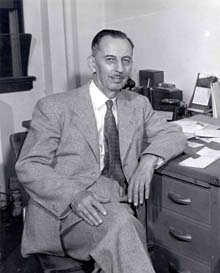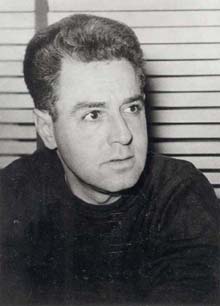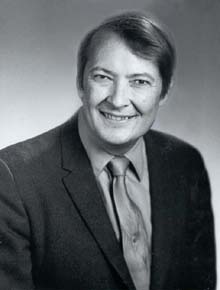 |
| E
d i t o r s . . . . . . . . . . . . . . . . . . . . . . . . . |
| A
total of five editors have overseen the publication of the Prairie
Schooner. These individuals, with their own creativity and
goals, have consistently maintained the high quality of the quarterly
and expanded its reputation as an internationally outstanding literary
publication.
|
|
| Lowry
Wimberly, 1926-1956. . . . . . |
Lowry Wimberly,
who assisted in the creation of the Prairie Schooner in
1926, sought high quality, new, and innovative writing for the
magazine. "We want a good magazine, but not stuffy." he explained.
"People want good reading."
(Journal Star,
6 December 1946)
|
 |
|
| Karl
Shapiro, 1956-1963 . . . . . . . . . . . . . . . . . . . .
 |
Coming to Nebraska from
California, Karl Shapiro explained that he was "impressed with
the literary climate of Lincoln." (Lincoln Journal,
12 September 1956)
Shapiro later resigned
when he disagreed with the decision of the University administration
to ban the publication of a work considered to be controversial.
He voiced his opposition and his goal to retain the authority given
to him as editor. |
|
| . . . . . .
. . . . . . . . . . . . . .Bernice Slote, 1963-1980 |
|
| When
Bernice Slote took over as editor of the Prairie Schooner,
it had an international subscription list and had been translated
into several languages. "It gets Nebraska around the world"
Slote worked to "find new writers to give new artists a chance."
(Omaha World Herald, 10 June 1965) |
|
|
 |
| Hugh Luke, 1980-1987
. . . . . . . . . . |
| Taking
over the editorship of the Schooner from Slote, Hugh Luke
explained that "I have no intention of making any changes
from the long traditional emphasis on publishing good poems,
good stories and good essays."
(Lincoln
Journal, 31 July 1980) |
|
|
| Hilda
Raz, 1987 to present . . . . . |
When
current editor of the Prairie Schooner, Hilda Raz, began
her work on the quarterly she explained that, "I
believe our audience is as interested in good writing and as eager
to read it as we are. I try to be alert to other ways of saying
things, to be open to experimental writing.... We're in business
to take chances. We're not Redbook. We're not meeting the expectations
of a particular audience. We're looking for the strong, the good,
the new. That's what we want."
(Journal-Star, 12 June 1988) |
 |
|
|